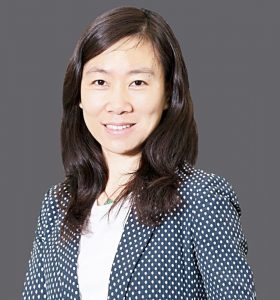 Lili Du, Ph.D. |Professor
Lili Du, Ph.D. |Professor
Department of Civil & Coastal Engineering
Department of Industrial and System Engineering (Affiliate)
Nelms Institute for Connected World Semmoto (courtesy)
University of Florida
Chair of AEP40-5|Emerging Technologies in Network Modeling, TRB
Chair of AI in Transportation Committee|Transportation & Development Institute, ASCE
IEEE Senior member
Group leader of Resilience and Sustainbility Initiative, UFTI
UF page | CV | Google Scholar | Linked in
Bio
Dr. Lili Du is a Principal Research Engineer and Lead AI Program Manager at the U.S. Department of Transportation Federal Highway Administration Turner-Fairbank Highway Research Center-FHWA, responsible for developing, leading, managing AI Enhanced Safety and Efficiency Program and projects, supporting Office of Safety and Operation Research and Development . Before that, she was an Associate and then Full Professor in the Civil and Coastal Engineering Department at University of Florida from 2017-2025. She also worked as an assistant and then an associate professor at the Illinois Institute of Technology (IIT) from 2012 to 2017, and as a Post-doctoral Research Associate for NEXTRANS at Purdue University from 2008 to 2012. She received her Ph.D. degree in Decision Sciences and Engineering Systems with a minor in Operations Research and Statistics from Rensselaer Polytechnic Institute in 2008, MS degree in Industrial Engineering from Tsinghua University in 2003, and her BS degree in Mechanical Engineering from Xi’an Jiaotong University, China in 1998.
Dr. Du’s research is characterized by integrating operations research, network modeling, game theory, control theory, AI, and statistical methods into traffic flow analysis, transportation system analysis, urban planning, and network modeling. Her current research mainly focuses on the impacts of connected and/or autonomous vehicles and electric vehicles, mobility on demand, smart curb, network resilience, and traffic flow analysis. Dr. Du’s research has been published hundreds of publications in Transportation Research Part B, Part C, and Part D, IEEE Transactions on ITS, Networks, and Spatial Economics, and prestigious conferences. She also delivered hundreds of invited talks and lectures in national and international seminars, workshop, symposiums, and conferences. Her research has been funded by NSF, State DOTs, STRIDE UTC, FMRI UTC, and Toyota InfoTechnology Center. Dr. Du was awarded as an NRC renowned Research Associate at the Federal Highway Administration-Turner-Fairbank Highway Research Center from 2023-2024. She was a recipient of the NSF CAREER award in 2016. Her project, “Driverless City” won the First Nayar Prize at IIT. She is the founding and active chair of both TRB AEP40-4 subcommittee on Emerging Technologies in Network Modeling and ASCE-T&DI Artificial Intelligence in Transportation Committee. She serves as an editor for Transportation Research Part B: Methodological and an associate editor for IEEE Transactions on Intelligent Transportation Systems, Journal of Intelligent Transportation Systems.
Research Interests
- Transportation system analysis and network modeling
- CV/AV/CAV/EV related network modeling and platooning control
- Big data analytics for traffic flow analysis
- AI applications in transportation systems
- Resilient civil infrastructure networks
- Mobility as a service
Award
- NRC Renowned Research Associate Award, FHWA Turner-Fairbank Highway Research Center, 2023.
- National Science Foundation CAREER Award (2016) for the research on Integrated Online Coordinated Routing and Decentralized Control for Connected Vehicle Systems
- Finalist of Illinois Institute of Technology inaugural Nayar Prize (2015) for the research on Driverless City Project
- National Science Foundation Award, CMMI 1436786 (2014) for Collaborative Research: Coordinated Real-Time Traffic Management Based on Dynamic Information Propagation and Aggregation under Connected Vehicle Systems
Editorial Service
- Member of Editorial Board Editors for Transportation Research Part B: Methodological
- Member of Editorial Advisory Board for Transportation Research Part C: Emerging Technologies
- Member of Associate Editors for IEEE transactions on ITS
- Member of Editorial Board for International Journal of Transportation Science and Technology
- Member of Editorial Board for Transportation Research Record
- Member of Editorial Board for the International Journal of Business Analytics, 2013 – 2018
- Associate Editor for the 17th, 18th International IEEE Conference on Intelligent Transportation Systems
- Guest Editor for IEEE ITS Special Issue on Modeling Dynamic Transportation Networks in the Age of
Connectivity, Autonomy and Data
International Academia Committee
- Chair of AI Task Committee, Transportation & Development Institute, ASCE
- Active Chair of TRB subcommittee on Emerging Technologies in Network Modeling (AEP40-5)
- Active Member of TRB Committee on Transportation Network Modeling (AEP40)
- Active Member of TRB Committee on Artificial Intelligence and Advanced Computing Applications (AED50)
- Active Member of ACES Connected and Autonomous Vehicle Impacts Committee
- Active Member of ICTD2019 Emerging Technologies Task Committee
- Previous Member of Transportation Research Board Technology Transfer Committee (ABG30)
